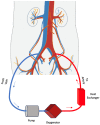Extracorporeal Membrane Oxygenation (VA-ECMO) in Management of Cardiogenic Shock
- PMID: 37685643
- PMCID: PMC10488419
- DOI: 10.3390/jcm12175576
Extracorporeal Membrane Oxygenation (VA-ECMO) in Management of Cardiogenic Shock
Abstract
Cardiogenic shock is a critical condition of low cardiac output resulting in insufficient systemic perfusion and end-organ dysfunction. Though significant advances have been achieved in reperfusion therapy and mechanical circulatory support, cardiogenic shock continues to be a life-threatening condition associated with a high rate of complications and excessively high patient mortality, reported to be between 35% and 50%. Extracorporeal membrane oxygenation can provide full cardiopulmonary support, has been increasingly used in the last two decades, and can be used to restore systemic end-organ hypoperfusion. However, a paucity of randomized controlled trials in combination with high complication and mortality rates suggest the need for more research to better define its efficacy, safety, and optimal patient selection. In this review, we provide an updated review on VA-ECMO, with an emphasis on its application in cardiogenic shock, including indications and contraindications, expected hemodynamic and echocardiographic findings, recommendations for weaning, complications, and outcomes. Furthermore, specific emphasis will be devoted to the two published randomized controlled trials recently presented in this setting.
Keywords: cardiogenic shock (CS); extracorporeal membrane oxygenation (ECMO); left ventricle (LV); mechanical circulatory support (MCS); venoarterial.
Conflict of interest statement
The authors declare no conflict of interest.
Figures
References
-
- Tsangaris A., Alexy T., Kalra R., Kosmopoulos M., Elliott A., Bartos J.A., Yannopoulos D. Overview of Veno-Arterial Extracorporeal Membrane Oxygenation (VA-ECMO) Support for the Management of Cardiogenic Shock. Front. Cardiovasc. Med. 2021;8:686558. doi: 10.3389/fcvm.2021.686558. - DOI - PMC - PubMed
-
- Mehta H., Eisen H.J., Cleveland J.C., Jr. American College of Cardiology; 2015. [(accessed on 9 March 2021)]. Indications and Complications for VA-ECMO for Cardiac Failure. Available online: https://www.acc.org/latest-in-cardiology/articles/2015/07/14/09/27/indic....
-
- Van Diepen S., Katz J.N., Albert N.M., Henry T.D., Jacobs A.K., Kapur N.K., Kilic A., Menon V., Ohman E.M., Sweitzer N.K., et al. Contemporary Management of Cardiogenic Shock: A Scientific Statement From the American Heart Association. Circulation. 2017;136:e232–e268. doi: 10.1161/CIR.0000000000000525. - DOI - PubMed
Publication types
LinkOut - more resources
Full Text Sources



